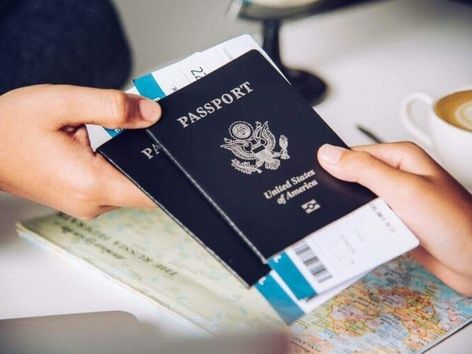EU Blue Card: Requirements and Procedure for Registration

EU Blue Card is a permit for living and working in one countries for highly qualified citizens of non -European states. Learn more about the requirements for obtaining, preference and procedure for document
The EU Blue Card is a work permit for citizens of countries outside the European Union. The document grants highly qualified specialists with certain special skills and appropriate education the right to live and work in the states of the region. A blue card can make moving to Europe much easier.
More on the benefits and procedure for obtaining a blue card in the EU.
What is the EU Blue Card?
The Blue Card system was approved by the European Council in May 2009. It works in 25 of the 27 EU countries, the permission does not extend to Denmark and Ireland. The main purpose of the permit is to attract highly qualified workers to the region, thereby contributing to the economic development and competitiveness of Europe, as well as solving the demographic problem of population aging.
Would you like to receive an answer from an experienced lawyer? Order legal advice from a local specialist in visa and migration issues. To receive the service, select the country you are interested in and your citizenship.
Advantages of the blue card
The Blue Card work permit provides a number of advantages to foreigners who plan to move to EU member states:
- Guarantees working conditions and wages at the same level as citizens of the countries.
- Gives the right to move freely between member countries of the Schengen area (with the exception of Romania, Bulgaria, Cyprus and Croatia).
- Socio-economic support: unemployment benefits, access to medicine and education.
- An opportunity for the employee to move with his family.
- Depending on the country, after living on the basis of a permit for a period of 2 to 5 years, you can apply for a permanent residence permit.
Procedure for issuing a blue card (Blue Card)
The process of obtaining a Blue Card work permit can be divided into 6 steps:
- Check whether you meet the requirements for issuing the document. Blue Card is issued only to citizens of non-EU countries. Also, the applicant must have a full university degree or 2-5 years of professional experience, conditions vary depending on the country.
- Find a job offer. A foreigner must have an offer from an employer in the country in which he plans to live. The employment contract must meet the minimum wage requirements.
- Prepare the necessary documents for obtaining a Blue Card. The standard package of documents includes: application form, passport, passport data, confirmation of educational qualification, CV and medical insurance.
- Register for an interview. The procedure for issuing a Blue Card differs depending on the country. The applicant must register for an interview at the embassy or consulate of the EU or a specific country in the country of residence.
- Submit an application. Usually, the embassy or consulate issues an entry visa for employment or obtaining a residence permit for crossing the border. The application for a blue card is filled out directly in the EU country at the local immigration department.
- Wait for the request to be processed. The processing time for the EU Blue Card is a maximum of 90 days, but the actual processing time depends on the country and authorities considering the application. If you have not received a response within the set time limit for processing your request, please contact the immigration service. Due to the fact that the registration procedure may differ depending on the country, we advise you to refer to the information page of the country to which you are applying.
Salary requirements for employees who work on the basis of a blue card (Blue Card)
In order to obtain a Blue Card, the employee's salary according to the employment contract must be 1.5 times higher than the average salary of the country of employment, for example:
- France – 53,836 euros per year;
- Germany – 56,400 euros per year;
- Italy – 24,789 euros per year;
- Malta - 16,036 euros per year.
What is the cost of obtaining an EU blue card?
The cost of obtaining an EU blue card depends on the country. It is the most expensive in Finland - 550 euros, in Bulgaria - 55 euros, and in Cyprus - free of charge.
Recommended articles
1 min
Travels
EES system: no more stamps in passports when entering the Schengen area
The European Union is launching a new automated system called EES to control the entry and exit of third-country nationals. Such a step will significantly simplify and speed up border crossing for travelers. Learn more about how the new system works and its benefits
16 Feb. 2023
More details1 min
Expats
Moving to the USA: Entry Rules and Legal Ways to Immigrate to America
The USA is a dream country for the life of many foreigners. When moving here, immigrants usually aim to live there for many years. However, there must be legal grounds for this. Learn more about the rules for legal entry and stay in the USA in 2023
19 Feb. 2023
More details2 min
Residence permit
Obtaining a second citizenship: advantages and disadvantages
Today, obtaining a second citizenship is in demand among foreigners. Such a step entails both advantages and disadvantages. Learn more about the pros and cons of getting a second passport
05 Apr. 2024
More details1 min
Employment
Business in Europe: which countries are better to choose for starting your own business in 2023
Over the past few years, the number of companies opened by foreigners in EU countries has increased significantly. We tell you what European countries attract entrepreneurs and where it is best to open your own business
22 Feb. 2023
More detailsAll materials and articles are owned by VisitWorld.Today and are protected by international intellectual property regulations. When using materials, approval from VisitWorld.Today is required.
